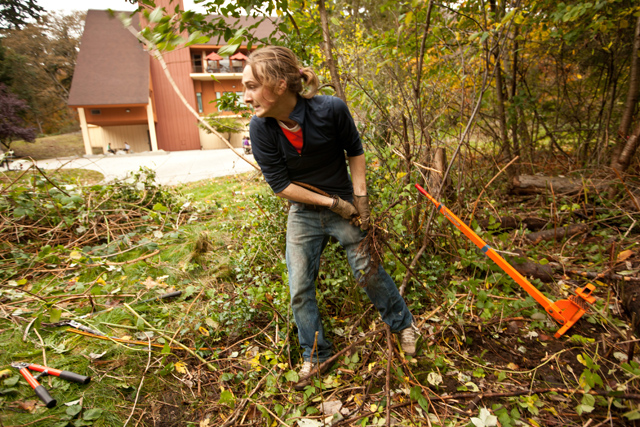
Reed Ojala-Barbour ’11 works at removing a stump as part of a habitat restoration project at Pacific Lutheran University.
Restoring native species
Last year, senior Reed Ojala-Barbour was looking for a summer job and turned his love for environmental studies into a venture to maintain the surrounding natural habitat at Pacific Lutheran University.
“First I realized PLU has an important natural habitat,” he said. “Then I realized PLU doesn’t have the grounds capacity to manage it.”
This realization inspired the Environmental Studies major to take the responsibility of land stewardship into his own hands, using his knowledge of habitats and invasive species to develop a plan to manage the natural habitat in PLU’s backyard. This venture has gone from a summer project to a permanent position in facilities that fosters volunteer opportunities for students and the greater community.
“This is a local issue and it’s possible to make an impact through action,” Ojala-Barbour said, who now holds the official title Habitat Restoration Volunteer Coordinator.
The local issue Ojala-Barbour is referring to is the maintenance of the surrounding natural habitat, which has been compromised by an invasive species of blackberries.
Before the Urban Habitat Restoration project began in 2009, which was started by Ojala-Barbour, the site of the project was inaccessible due to dense thickets of Himalayan blackberries. More specifically, this invasive species has affected a critically threatened species of oak tree that is native to the area.
Now, after more than a year of maintenance by Ojala-Barbour and other student and community volunteers, the site has made significant progress and is ready for planting.
The project has gained wide recognition, and after being fully backed by the university the project boasts grant funding from the Greater Tacoma Community Foundation and the Green Partnership Fund. Ojala-Barbour said he never thought his summer project would turn into something of this proportion.
“We collected acorns from trees on campus and we’ve seen them grow into little trees,” Ojala-Barbour said. “It’s been rewarding to see the whole process.”
There has been tremendous success in the direction of the Urban Habitat Restoration project. However, a greater, far-reaching success has come from the community connections made as the project has grown.
“You’re not just changing something but you’re building a community around that,” Ojala-Barbour said.
Local seniors from Washington High School have participated in the project, by assisting in site planting and maintenance. Campus organizations including the sustainability club GREAN have also participated regularly at the project site.
Ojala-Barbour sees this type of land maintenance as an unsung local issue that deserves attention.
“Land stewardship isn’t at the forefront of sustainability issues, so it was something I realized I could make an impact on,” he said.
Ojala-Barbour said there have been talks about expanding the restoration site, and said the investment in expansion of the site could potentially save the university money. He said the site could include parts of the current golf course, once that land is redeveloped.
“I’m hoping that area becomes a part of the natural habitat restoration site,” he said. “It seems it’s in the best interest of the university.”
The grant proposal approved by the Greater Tacoma Community Foundation outlined plans for the site to be dedicated as the Fred L. Tobiason Outdoor Learning Center. Ojala-Barbour said the goal is to dedicate the area by Earth Week and host an unveiling event to celebrate.
Beyond the grant funding, the growth in recognition and his newly established position in Facilities, Ojala-Barbour mostly emphasized the importance of local land stewardship and a dedication to sustainability issues.
“PLU’s habitat has value. The natural area is important and connected to other habitats in the area,” he said. “It isn’t an island.”
The main advice Ojala-Barbour gives to aspiring environmental activists is to think positive.
“Don’t get bogged down by the severity of the issues, but rather feel empowered to take action,” he said.


